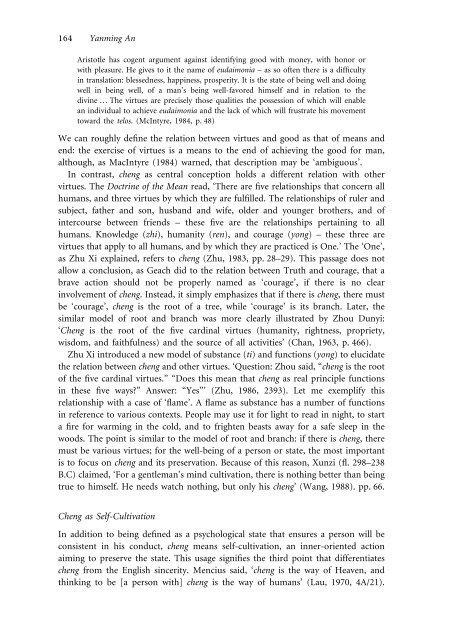Western sincerity and Confucian Cheng
Create successful ePaper yourself
Turn your PDF publications into a flip-book with our unique Google optimized e-Paper software.
164 Yanming An<br />
Aristotle has cogent argument against identifying good with money, with honor or<br />
with pleasure. He gives to it the name of eudaimonia –assooften there is a difficulty<br />
in translation: blessedness, happiness, prosperity. It is the state of being well <strong>and</strong> doing<br />
well in being well, of a man’s being well-favored himself <strong>and</strong> in relation to the<br />
divine … The virtues are precisely those qualities the possession of which will enable<br />
an individual to achieve eudaimonia <strong>and</strong> the lack of which will frustrate his movement<br />
toward the telos. (McIntyre, 1984, p. 48)<br />
We can roughly define the relation between virtues <strong>and</strong> good as that of means <strong>and</strong><br />
end: the exercise of virtues is a means to the end of achieving the good for man,<br />
although, as MacIntyre (1984) warned, that description may be ‘ambiguous’.<br />
In contrast, cheng as central conception holds a different relation with other<br />
virtues. The Doctrine of the Mean read, ‘There are five relationships that concern all<br />
humans, <strong>and</strong> three virtues by which they are fulfilled. The relationships of ruler <strong>and</strong><br />
subject, father <strong>and</strong> son, husb<strong>and</strong> <strong>and</strong> wife, older <strong>and</strong> younger brothers, <strong>and</strong> of<br />
intercourse between friends – these five are the relationships pertaining to all<br />
humans. Knowledge (zhi), humanity (ren), <strong>and</strong> courage (yong) –these three are<br />
virtues that apply to all humans, <strong>and</strong> by which they are practiced is One.’ The ‘One’,<br />
as Zhu Xi explained, refers to cheng (Zhu, 1983, pp. 28–29). This passage does not<br />
allow a conclusion, as Geach did to the relation between Truth <strong>and</strong> courage, that a<br />
brave action should not be properly named as ‘courage’, if there is no clear<br />
involvement of cheng. Instead, it simply emphasizes that if there is cheng, there must<br />
be ‘courage’, cheng is the root of a tree, while ‘courage’ is its branch. Later, the<br />
similar model of root <strong>and</strong> branch was more clearly illustrated by Zhou Dunyi:<br />
‘<strong>Cheng</strong> is the root of the five cardinal virtues (humanity, rightness, propriety,<br />
wisdom, <strong>and</strong> faithfulness) <strong>and</strong> the source of all activities’ (Chan, 1963, p. 466).<br />
Zhu Xi introduced a new model of substance (ti) <strong>and</strong> functions (yong) toelucidate<br />
the relation between cheng <strong>and</strong> other virtues. ‘Question: Zhou said, “cheng is the root<br />
of the five cardinal virtues.” “Does this mean that cheng as real principle functions<br />
in these five ways?” Answer: “Yes”’ (Zhu, 1986, 2393). Let me exemplify this<br />
relationship with a case of ‘flame’. A flame as substance has a number of functions<br />
in reference to various contexts. People may use it for light to read in night, to start<br />
a fire for warming in the cold, <strong>and</strong> to frighten beasts away for a safe sleep in the<br />
woods. The point is similar to the model of root <strong>and</strong> branch: if there is cheng, there<br />
must be various virtues; for the well-being of a person or state, the most important<br />
is to focus on cheng <strong>and</strong> its preservation. Because of this reason, Xunzi (fl. 298–238<br />
B.C) claimed, ‘For a gentleman’s mind cultivation, there is nothing better than being<br />
true to himself. He needs watch nothing, but only his cheng’ (Wang, 1988). pp. 66.<br />
<strong>Cheng</strong> as Self-Cultivation<br />
In addition to being defined as a psychological state that ensures a person will be<br />
consistent in his conduct, cheng means self-cultivation, an inner-oriented action<br />
aiming to preserve the state. This usage signifies the third point that differentiates<br />
cheng from the English <strong>sincerity</strong>. Mencius said, ‘cheng is the way of Heaven, <strong>and</strong><br />
thinking to be [a person with] cheng is the way of humans’ (Lau, 1970, 4A/21).


